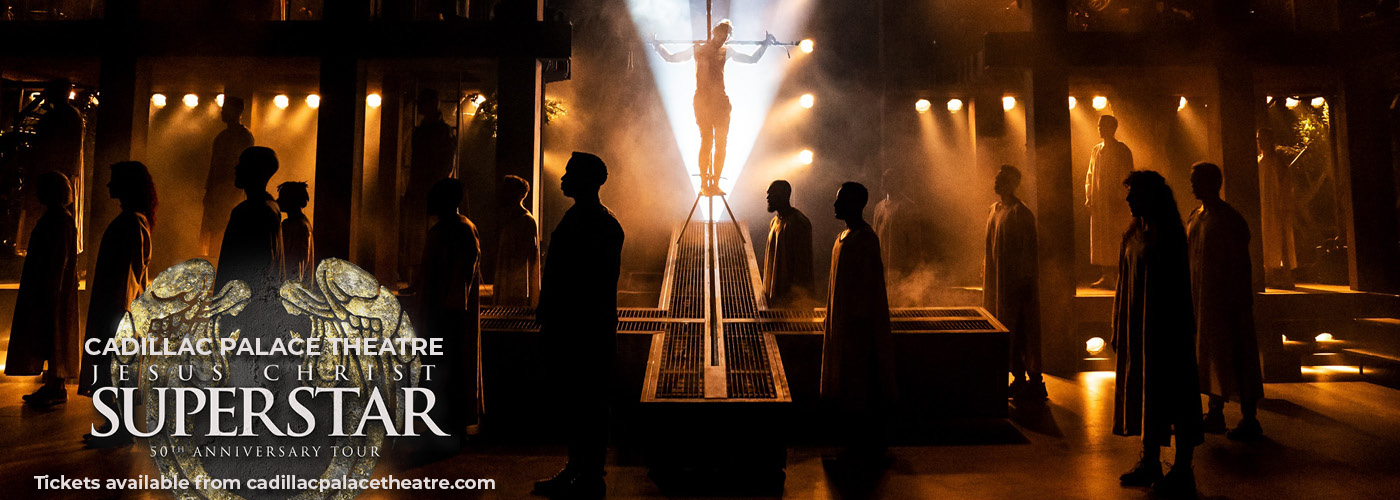Jesus Christ Superstar Tickets
 In 1971 Jesus Christ Superstar made its debut. This is the rock opera, with music by Andrew Lloyd Webber and lyrics by Tim Rice, loosely based on the Gospels’ accounts of the Passion, with the story largely centered on Judas, who is dissatisfied with the direction in which Jesus is steering his disciples. Contemporary attitudes, sensibilities and slang pervade the rock opera’s lyrics, and ironic allusions to modern life are scattered throughout the depiction of political events.
In 1971 Jesus Christ Superstar made its debut. This is the rock opera, with music by Andrew Lloyd Webber and lyrics by Tim Rice, loosely based on the Gospels’ accounts of the Passion, with the story largely centered on Judas, who is dissatisfied with the direction in which Jesus is steering his disciples. Contemporary attitudes, sensibilities and slang pervade the rock opera’s lyrics, and ironic allusions to modern life are scattered throughout the depiction of political events.
2016 winner of Best Musical and 2017 winner of Best Musical Revival!
“One of the greatest pieces of live theater I’ve ever seen” – Austin American Statesman
“Hallelujah! An almighty revelation.” – The Daily Telegraph

Judas Iscariot, one of the Twelve Apostles, worries that the followers of Jesus are getting out of control and may be seen as a threat by the Roman Empire, who might harshly suppress them, the other apostles anticipate going to Jerusalem with Jesus and ask him about his plans, but Jesus tells them not to worry about the future.
Caiaphas, the High Priest of Israel, assembles the Pharisees and priests. Like Judas, they fear that Jesus’s followers will be seen as a threat by the Romans, and that many Jews might suffer the consequences. Caiaphas concludes that for the greater good, Jesus must be killed.
Pontius Pilate, the governor of Judea, has a dream in which he meets a Galilean and then receives the blame for the man’s violent death at the hands of a mob.
Conflicted, Judas seeks out the Pharisees and proposes helping them arrest Jesus, believing that Jesus is out of control and that Jesus himself would approve of his action. In exchange for his help, Judas is offered thirty pieces of silver. Judas initially refuses, then accepts when Caiaphas suggests that he can use the money to help the poor.
As Jesus shares a Passover meal with his disciples, they get drunk and pay little attention to him, frustrated by their lack of understanding, he predicts that Peter will deny him three times that night, and that another one of them will betray him. Judas admits that he is the one who will betray Jesus and, saying that he does not understand why Jesus did not plan things better, leaves. Judas arrives with Roman soldiers and identifies Jesus by kissing him on the cheek When Jesus is brought to trial before the Sanhedrin, Caiaphas demands to know if he calls himself the Son of God, and Jesus responds merely “That’s what you say”. Annas says that this is sufficient evidence and Caiaphas sends him to Pilate. Meanwhile, Peter is confronted by three people, to whom he denies that he knows Jesus Mary observes that Jesus had predicted this.
Pilate asks Jesus if he is the King of the Jews, and to reduce his involvement with the explosive issue and since Jesus is from Galilee, Pilate says that he is not under his jurisdiction and sends him to King Herod.
Judas is horrified at Jesus’ harsh treatment. He expresses regret to the Pharisees, fearing that he will forever be remembered as a traitor. Caiaphas and Annas assure him that he has done the right thing. Judas throws down the money he was given and storms out. He curses God for manipulating him and commits suicide.
At Jesus’s trial, Pilate attempts to interrogate Jesus, but is cut off by a bloodthirsty mob which demands that Jesus be crucified. He tells the mob that Jesus has committed no crime and does not deserve to die, but to satisfy the mob he will have Jesus flogged. Jesus is ultimately crucified, recites his final words, and dies. Jesus’ body is taken down from the cross and buried.

Initially unable to get backing for a stage production, the composers released it as a concept album, the success of which led to the show’s Broadway on-stage debut in 1971. By 1980, the musical had grossed more than $237 million worldwide. Running for over eight years in London between 1972 and 1980, it held the record for longest-running West End musical before it was overtaken by Cats in 1989.
The musical opened on Broadway in October 1971, directed by Tom O’Horgan, at the Mark Hellinger Theatre, to its fair share of controversy, and garnering mixed reviews, though, the bold casting of African Americans as Judas was lauded. The Broadway show and subsequent productions have been condemned by religious groups, with some Christians considering such comments to be blasphemous, and some Jews claiming that it bolstered the antisemitic belief that the Jews were responsible for Jesus’s death by showing most of the villains as Jewish and showing the crowd in Jerusalem calling for the crucifixion. The musical was also banned in South Africa for being “irreligious”.
“This ‘Superstar’ has a lush, glorious sound the likes of which you’ve never heard before.”– Chicago Sun Times
“Until now, I have never come across an approach to this piece that taps into its latent power… As reinvigorated by the director Timothy Sheader, ‘Superstar’ delivers a genuinely primal jolt.” – New York Times
“Sprinkling of genius sends stylish ‘Superstar’ soaring. Timothy Sheader offers some of the most stylish direction I’ve seen all year, sculpting each segment into something distinct and vivid and compelling.” – Evening Standard
“This “Superstar” began life at The Stratford Shakespeare Festival and then had a final tune-up at the La Jolla Playhouse. McAnuff deserves credit for trying to make the story relevant — a ticker at the beginning even counts back the years from 2012 to A.D. 33 for those unfamiliar with history — but with its defiant fringe kids, boxy set, blinding lights and sneering cynicism, he ends up making it feel more like Rent.” – The Associated Press.
“The hit of last summer’s Stratford Shakespeare Festival, where McAnuff is artistic director, the production’s key onstage asset is its Judas Iscariot, Josh Young. And given that this account of the final week in the life of Jesus of Nazareth is told from his betrayer’s point of view, it’s fitting that Young’s electrifying vocals and brooding presence dominate. … The 1971 religious rock opera remains a psychologically lite relic of its time, but it gets propulsive treatment in this energized, vocally robust revival.” – The Hollywood Reporter.
